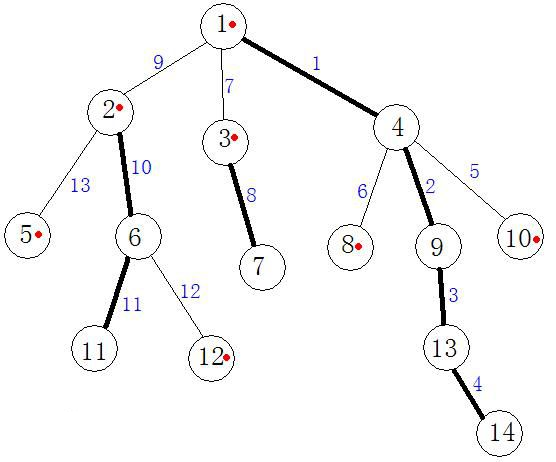1
2
3
4
5
6
7
8
9
10
11
12
13
14
15
16
17
18
19
20
21
22
23
24
25
26
27
28
29
30
31
32
33
34
35
36
37
38
39
40
41
42
43
44
45
46
47
48
49
50
51
52
53
54
55
56
57
58
59
60
61
62
63
64
65
66
67
68
69
70
71
72
73
74
75
76
77
78
79
80
81
82
83
84
85
86
87
88
89
90
91
92
93
94
95
96
97
98
99
100
101
102
103
104
105
106
107
108
109
110
111
112
113
114
115
116
117
118
119
120
121
122
123
124
125
126
127
128
129
130
131
132
133
134
135
136
137
138
139
140
141
142
143
144
145
146
147
148
149
150
151
152
153
154
155
156
157
158
159
160
161
162
163
164
165
166
167
| #include <algorithm>
#include <iostream>
#include <fstream>
#include <cstring>
#include <cstdlib>
#include <cstdio>
#define mmst(a, b) memset(a, b, sizeof(a))
#define lson (root<<1)
#define rson ((root<<1)|1)
using namespace std;
const int MAXN = 30010;
const int MAXE = MAXN<<1;
void ri(int &x);
int n, q;
int to[MAXE], nex[MAXE], Mindex[MAXN], cur=0;
int w[MAXN], v[MAXN], top[MAXN], fa[MAXN], son[MAXN], siz[MAXN], depth[MAXN], z=0;
int SUM[MAXN<<2], MAX[MAXN<<2];
void addEdge(const int a, const int b);
void dfs(const int x)
{
son[x] = 0;
siz[x] = 1;
for (int i=Mindex[x]; i!=-1; i=nex[i])
{
if (to[i] != fa[x])
{
fa[to[i]] = x;
depth[to[i]] = depth[x] + 1;
dfs(to[i]);
if (siz[to[i]] > siz[son[x]]) son[x] = to[i];
siz[x] += siz[to[i]];
}
}
}
void set_tree(const int x, const int tp)
{
top[x] = tp;
w[x] = ++z;
if (son[x]!=0) set_tree(son[x], tp);
for (int i=Mindex[x]; i!=-1; i=nex[i])
{
if (to[i]!=fa[x] && to[i]!=son[x])
{
set_tree(to[i], to[i]);
}
}
}
void update(int l, int r, int p, int val, int root)
{
if (l==r) { SUM[root] = MAX[root] = val; return ; }
const int mid = (l+r) >> 1;
if (p<=mid) update(l, mid, p, val, lson);
else update(mid+1, r, p, val, rson);
SUM[root] = SUM[lson] + SUM[rson];
MAX[root] = max(MAX[lson], MAX[rson]);
}
int qMax(int l, int r, int L, int R, int root)
{
if (L<=l && r<=R) return MAX[root];
const int mid = (l+r) >> 1;
int ref = -MAXN;
if (L<=mid) ref = qMax(l, mid, L, R, lson);
if (mid<R) ref = max(ref, qMax(mid+1, r, L, R, rson));
return ref;
}
int qSum(int l, int r, int L, int R, int root)
{
if (L<=l && r<=R) return SUM[root];
const int mid = (l+r) >> 1;
int ref = 0;
if (L<=mid) ref = qSum(l, mid, L, R, lson);
if (mid<R) ref += qSum(mid+1, r, L, R, rson);
return ref;
}
int findMax(int a, int b)
{
int ref = -MAXN;
int f1 = top[a], f2 = top[b];
while (f1 != f2)
{
if (depth[f1] < depth[f2]) { swap(a, b); swap(f1, f2); }
ref = max(ref, qMax(1, z, w[f1], w[a], 1));
a = fa[f1];
f1 = top[a];
}
if (a == b) return max(ref, v[a]);
if (depth[a] > depth[b]) swap(a, b);
return max(ref, qMax(1, z, w[a], w[b], 1));
}
int findSum(int a, int b)
{
int ref = 0;
int f1 = top[a], f2 = top[b];
while (f1 != f2)
{
if (depth[f1] < depth[f2]) { swap(a, b); swap(f1, f2); }
ref += qSum(1, z, w[f1], w[a], 1);
a = fa[f1];
f1 = top[a];
}
if (a == b) return ref + v[a];
if (depth[a] > depth[b]) swap(a, b);
return ref + qSum(1, z, w[a], w[b], 1);
}
int main()
{
mmst(Mindex, -1);
ri(n);
for (int i=1, a, b; i<n; ++i)
{
ri(a); ri(b);
addEdge(a, b);
}
for (int i=1; i<=n; ++i)
ri(v[i]);
siz[0] = 0; depth[1] = 1; fa[1] = 0;
dfs(1);
set_tree(1, 1);
for (int i=1; i<=n; ++i)
update(1, z, w[i], v[i], 1);
ri(q);
char que[7];
int q1, q2;
while (q--)
{
scanf("%s", que);
ri(q1); ri(q2);
if (que[1] == 'M') printf("%d\n", findMax(q1, q2));
else if (que[1] == 'S') printf("%d\n", findSum(q1, q2));
else update(1, z, w[q1], v[q1]=q2, 1);
}
return 0;
}
inline void addEdge(const int a, const int b)
{
to[cur] = b; nex[cur] = Mindex[a]; Mindex[a] = cur++;
to[cur] = a; nex[cur] = Mindex[b]; Mindex[b] = cur++;
}
inline void ri(int &x)
{
char c; bool minus = false;
while ((c=getchar())<'0' || '9'<c) if (c=='-') minus=true;
x = c-'0';
while ('0'<=(c=getchar()) && c<='9')
x = 10*x+c-'0';
if (minus) x = -x;
}
|

